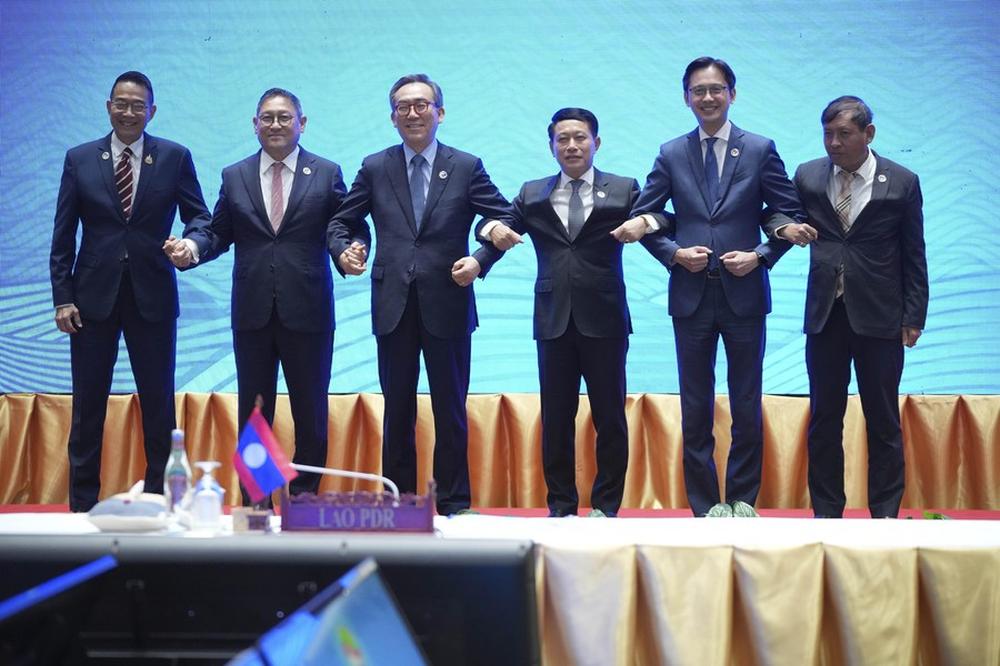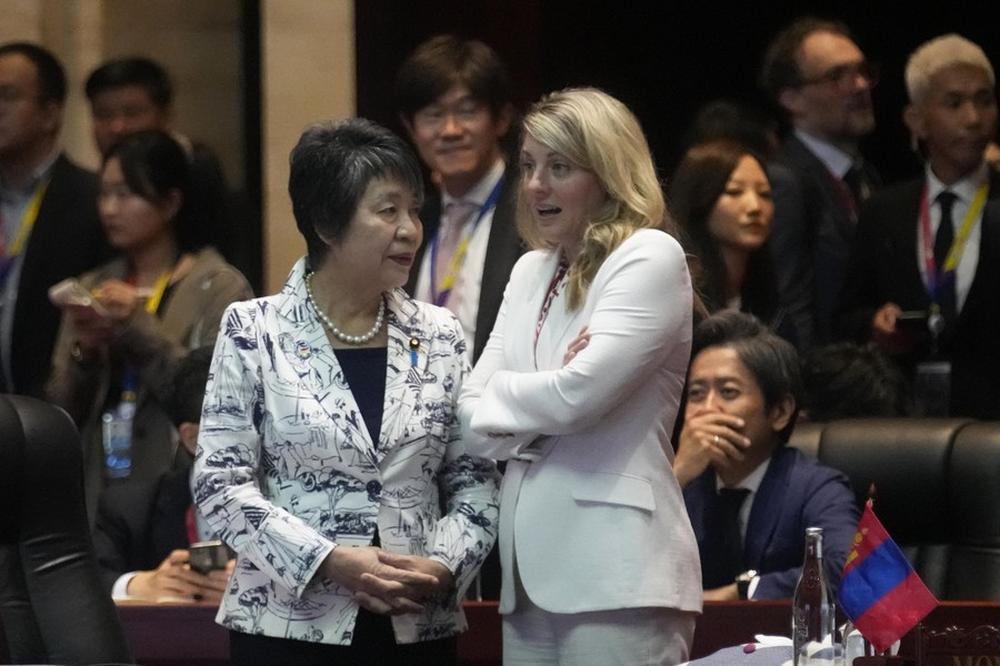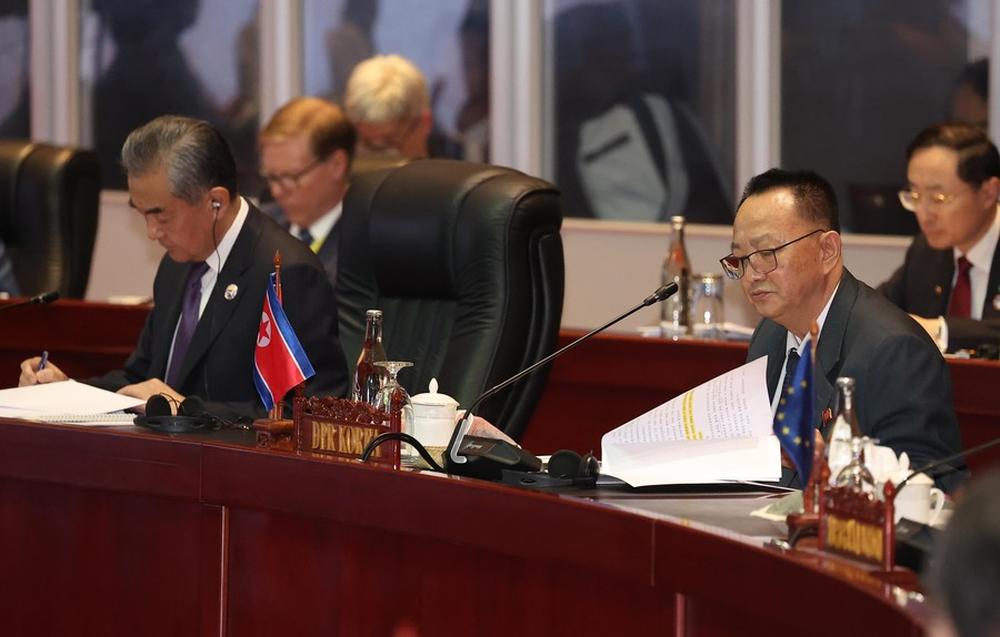
- #China
- #Global Issues
- #Multilateral Relations
- #US Foreign Policy

► Challenges to ARF's Relevance: The ASEAN Regional Forum (ARF) faces challenges from rising geopolitical tensions, the proliferation of competing security dialogues, and internal ASEAN conflicts, which threaten its relevance and centrality in regional security.
► Strategic Balancing: ASEAN must navigate between the U.S.-led security architecture and China's growing influence, maintaining strategic autonomy while preventing a destabilizing arms race and ensuring regional stability through confidence-building and conflict resolution.
► Strengthening ASEAN's Role: To maintain its leadership, ASEAN needs to reinforce its internal cohesion, address emerging issues like AI and cybersecurity, and prioritize regionally resonant agendas, ensuring its central role in regional security and diplomacy.
The Cold War’s end ushered in a period of optimism toward a new era of global stability and peace. This environment, characterized by the dissolution of hostile alliances, engendered homegrown security dialogues in various regions. In Asia, the establishment of the ASEAN Regional Forum (ARF) in 1994 marked a significant milestone in the shift towards ASEAN-centric regional security cooperation. The ARF, comprising the ten ASEAN member states and 17 external partners (including the United States, China, Russia, the European Union, South Korea, and North Korea), was envisioned as a platform to facilitate dialogue on political and security issues, build trust, and promote preventive diplomacy.
The ARF’s Evolution and Emerging Challenges
The ARF's inception represented a significant shift from the Cold War era’s characteristic mistrust and hostility. It introduced a model of international cooperation based on consensus-building, informal approaches, and voluntary compliance. However, just having marked its 30th anniversary, the ARF faces critical challenges that threaten its relevance in a rapidly evolving geopolitical landscape. The rise of a more assertive China and the West’s strategic response have intensified global competition, inducing greater factionalization and the securitization of multiple domains. The protracted wars in Ukraine and the Middle East, alongside the growing likelihood of military confrontation in Asia, have heightened concerns that the world is teetering on the brink of a “hot war.” The initial post-Cold War euphoria is unmistakably waning.
In this context, the ARF is increasingly challenged by the proliferation of security dialogues and forums within and outside the region. ASEAN-led platforms like the ASEAN Defense Ministers’ Meeting Plus (ADMM-Plus) and the East Asia Summit (EAS) often crowd the purview of the ARF. Moreover, those ASEAN-led platforms compete with external mechanisms, such as the Shanghai Cooperation Organization (SCO) and the Conference on Interaction and Confidence Building in Asia (CICA), led by China and Russia, and minilateral partnerships such as QUAD, AUKUS, South Korea-US-Japan, and US-Japan-Philippines, led by the US. These forums’ overlapping agendas and objectives threaten to dilute the ARF’s influence and centrality in the region.
The 31st ARF: Key Achievements and Persistent Limitations
The 31st ASEAN Regional Forum, held in July of this year, underscored the complexities facing the ARF today. While the forum continues to evolve beyond security issues to more contemporary topics like cybersecurity, climate change, and artificial intelligence, its significant limitations have also been exposed. Beyond merely reiterating past statements, the 31st ARF struggled to reconcile diverse perspectives among member states. The three-day delay in releasing the chairman’s statement emblemized this difficulty in an increasingly polarized environment.
These developments raise pressing questions about the ARF’s relevance as a security consultative body in the contemporary context. Can the ARF remain an effective platform for regional security cooperation, rather than a relic of a bygone era? The need to reassess the ARF’s role is more urgent than ever.
Rethinking the ARF’s Role Amid Rising Neo-Cold War Tensions
The shifting power dynamics in the Indo-Pacific, particularly the waning American dominance, present both challenges and opportunities for ASEAN. As the U.S. adjusts its military strategy from a “hub-and-spoke” model to a more integrated “network” structure, emphasizing trilateral and multilateral security partnership and military exercises with allies like Japan, Australia, and the Philippines, this strategy has often encountered resistance from regional actors reluctant to fully commit to a U.S.-led security architecture. These actors opt instead to preserve their strategic autonomy in the face of China’s growing influence.
But what if the U.S. reduces its engagement in the region without adequate safeguards? The likely result would be a security vacuum that would prompt individualized military buildups among regional states and potentially trigger a destabilizing arms race. In this scenario, the importance of building trust and establishing robust mechanisms for conflict resolution cannot be overstated.
A 2023 survey of 1,308 elites from ASEAN countries revealed that while China is seen as the most influential economic and security actor in the region, a majority in most ASEAN countries express concern about its expanding influence. Furthermore, a majority (in seven out of ten ASEAN countries) would align with the United States if forced to choose between the two powers. This preference for the U.S.-led order, despite China’s growing clout, underscores the delicate balancing act ASEAN must perform to maintain regional stability.
Nevertheless, the ARF must remain a platform for nations apprehensive of, or opposed to, the U.S.-led order. To mitigate the risk of an arms race under escalating geopolitical tensions, ASEAN must strengthen its mechanisms for confidence-building and dispute resolution to ensure that the ARF remains a central and effective forum for regional security.
The Need for ASEAN Unity and the Quest for Centrality
As Cold War-reminiscent tensions grow, the role of regional security platforms like the ARF becomes ever more critical. To ensure that ASEAN remains the cornerstone of regional security architecture, its convening power must be strengthened. This requires a more assertive and dynamic approach to maintaining ASEAN’s cohesion and effectiveness.
First, ASEAN must prioritize regionally resonant agendas that nonetheless center its significance. Given ASEAN’s demographic and technological landscape, particularly its young, digitally savvy population, the bloc is well-positioned to influence global discussions on AI and cybersecurity. Similarly, the ARF could bolster its relevance by addressing emerging security challenges in these areas, such as with a comprehensive code of conduct on AI and cybersecurity. This would not only demonstrate ASEAN’s leadership on critical issues, but also reinforce its central role in regional stability by addressing one of the diplomatic priorities of key players like South Korea.
Second, the ASEAN Way, which emphasizes consensus and non-interference, should not undermine ASEAN’s centrality. To build a truly ASEAN-centric body and create a favorable strategic environment, internal conflicts among member states such as Brunei, Malaysia, the Philippines, and Vietnam should be resolved before engaging with external actors. Outward disunity, as with the South China Sea issue, could push countries like the Philippines to seek closer ties with external powers, thereby weakening ASEAN’s internal cohesion.
To address the limitations of the ASEAN Way, the organization must tackle issues on two fronts. First, matters of diverse identities, such as religion and governance, should be respected by adopting a “lowest common denominator” approach that aligns with ASEAN’s traditions. Second, however, strategic issues like the South China Sea and the Myanmar civil war require active solutions based on ASEAN’s own vision and principles. These issues demand maximum commitment from all members. Strengthening internal cohesion and demonstrating decisive leadership would be essential for ASEAN to maintain its central role in regional security and diplomacy.
Conclusion
Under increasing global tensions, consensus-building and regional cooperation are paramount. Thus, ASEAN's convening power, a capability neither the U.S. nor China can easily replicate, is an invaluable asset for regional security consultations. By strengthening the ARF toward ASEAN member states’ envisioned order, the ARF’s role in stabilizing the volatile regional landscape and shaping a prosperous future for all will be significantly enhanced.
To fully realize ASEAN’s convening power and corresponding influence on the regional order, a two-track approach, starting within ASEAN and extending across the entire ARF, is essential. This approach involves, first, acknowledging autonomy in matters of national sovereignty and core values by seeking members’ minimal common denominator(s), and second, establishing a mechanism where other member states can collectively share the burden in areas that, while not directly related, pose potential risks or challenges.
I hope this vision will be incorporated into the ASEAN Community Vision 2025-2045, which is nearing completion. Additionally, I encourage South Korea, as the chair of the ARF EEPs this year and next, to take a more active role in advancing this initiative.

Yoon Jung Choi is Vice President, Director of the Center for Diplomatic Strategy and the Center for Indo-Pacific Studies at the Sejong Institute. Her research expertise encompasses geopolitics and geoeconomics in the Indo-Pacific region, with a specific focus on countries in South and Southeast Asia. Notably, she has conducted extensive research delving into economic and technological dimensions while maintaining a core interest in the regional dynamics towards an inclusive global order. Beyond her academic contributions, Dr. Choi has considerable professional and hands-on experience in policy development. Her current official assignments include membership within the Policy Advisory Council for the National Security Office (NSO) in the Office of the President and the ROK’s ASEAN Regional Forum's Experts and Eminent Persons. She also collaborates closely with governmental bodies such as the Ministry of Unification and the Ministry of Trade, Industry & Energy (MOTIE), serving on advisory and evaluation committees.


